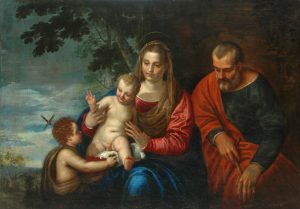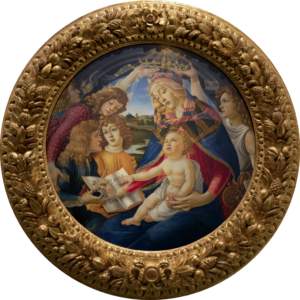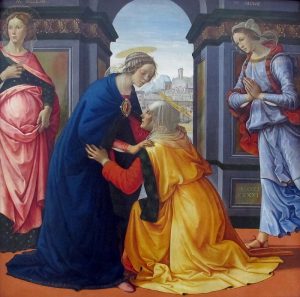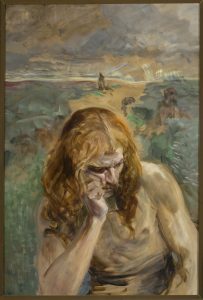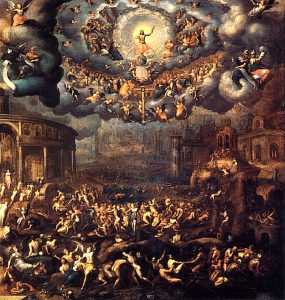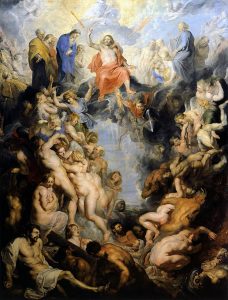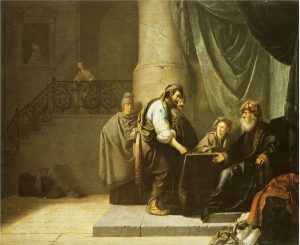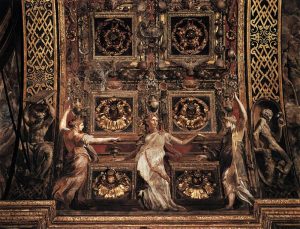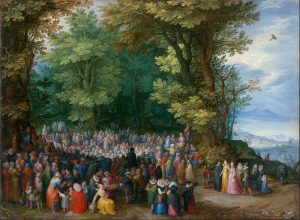Illuminations on the Lectionary readings for Christmas Day I, II, and III (Dec. 25, 2023)
(Lectionary Selections I, II, and III are suggested for use for Christmas Eve midnight, Christmas dawn, and the main service on Christmas Day, respectively.).
Christmas Day I
First Reading, Selection I: Isaiah 9:2-7
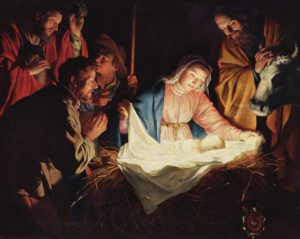
Adoration of the shepherds (1622). Oil painting on canvas by Gerard van Honthorst (1590–1656), Wallraf-Richartz-Museum, Cologne, Germany. (Click image to enlarge)
Christmas has come! We see a great light and sing a new song as we behold with joy in the city of David the birth of a Savior, who is the Messiah, the Lord. In our first reading, we hear words of the prophet Isaiah that would inspire the composer George Frideric Handel in “The Messiah.” The prophet foretells a glorious future when the oppressor’s yoke will be broken and a child will be born for us, a son given to us, a Wonderful Counsellor will take the throne of David: Mighty God, Everlasting Father, Prince of Peace.
Psalm, Selection I: Psalm 96
All the earth sings a new song, blessing God’s name in this joyous psalm of praise. There is fascinating theology here, ideas that we may see reflected in the New Testament: We are called to proclaim the good news of God’s salvation; we are to go out and declare God’s glory, a great commission to show God’s majesty to all the nations. The whole earth, the heavens, the seas, the forests and all that is in them rejoice before our God.
Second Reading, Selection I: Titus 2:11-14
Here’s a Bible trivia fact: Titus is the only book of the New Testament that does not appear in the regular three-year Lectionary of Sunday service readings. We read in it only on Christmas Day. Much of Titus’ short letter is spent warning the people of Crete to rein in their sinful behavior, an instruction that leads to a worthy conclusion: We should live well and renounce bad actions as we wait for the grace of God through Jesus Christ, who gave himself to redeem us and make us God’s people.
Gospel, Selection I: Luke 2:1-14(15-20)
Now we come to the familiar Gospel story of Jesus’s birth. On this day we read the nativity according to Luke. We hear the memorable stories of Mary giving birth, wrapping the child in swaddling clothes and laying him in a manger in Bethlehem – the City of David – because there was no room in the inn. Here we have the beautiful scene of baby Jesus and his parents suddenly surrounded by shepherds and their flocks. Angels sing gloriously overhead while the Lord’s angel tells them that the baby is a Savior and the Messiah.
Christmas Day II
First Reading, Selection II: Isaiah 62:6-12
In this reading from Isaiah, the people’s exile is ending. Through the power of God’s strong right hand and mighty arm, they will return to Jerusalem. Prepare the way, build up the highway toward home and clear it of stones, the prophet shouts. No longer shall enemies harvest Zion’s grain and drink its wine. God will bring a glorious future of redemption and salvation that will last until the end of time.
Psalm, Selection II: Psalm 97
God is king, and all creation rejoices. This Psalm praises God in an image of power and might that echoes the fearsome God who led the Israelites through the desert and protected them there, surrounded by clouds, lightning and fire. This psalm shows us a God over all other gods, over all other nations, but it also reveals a God who loves the righteous, provides light for them, and cares for those who live justly.
Second Reading, Selection II: Titus 3:4-7
In this passage, Titus emphasizes that Jesus is God, our savior, the perfect manifestation of goodness and loving-kindness. Jesus saved us not because of any good that we had done, but entirely because he is merciful, giving us God’s grace through baptism by water and the Holy Spirit. Justified by God’s grace, we become heirs to eternal life through Jesus.
Gospel, Selection II: Luke 2:(1-7)8-20
Here again is the familiar Gospel story of Jesus’s birth, the nativity according to Luke. This passage tells us the memorable accounts of Mary giving birth, wrapping the child in swaddling clothes and laying him in a manger in Bethlehem – the City of David – because there was no room in the inn. Here we have the beautiful scene of baby Jesus and his parents suddenly surrounded by shepherds and their flocks. Angels sing gloriously overhead while the Lord’s angel tells them that the baby is a Savior and the Messiah.
Christmas Day III
First Reading, Selection III: Isaiah 52:7-10
Israel’s exile in Babylon is ending in this selection from Isaiah, and God’s messenger brings good news of peace and salvation. When God leads the people back to Zion, the temple on the mountain, Jerusalem, even the ruins of the devastated city will break into song. Such is the joy of God’s return to the holy city: God reigns, the people are comforted, and all the nations shall see the power of God’s holy arm and the salvation that it brings.
Psalm, Selection III: Psalm 98
This Psalm of praise, filled with joyous music, harps, trumpets and horns, calls us to stand up and rejoice. We sing a new song of praise for the victory won by God’s mighty right hand and holy arm. All the nations, not only Israel, shout with joy. Even the sea, the land, the rivers and the hills will rejoice when God comes to judge all the world with righteousness and equity. Lift up your voice! Rejoice and sing!
Second Reading, Selection III: Hebrews 1:1-4,(5-12)
The letter to the Hebrews begins with a beautifully poetic description of Jesus: Chosen as the son of God, he is the perfect reflection of God’s glory, higher even than the angels. Indeed, the author of Hebrews tells us, when Jesus was born into the world, multitudes of angels appeared in the heavens to worship him. Because Jesus loved righteousness and hated wickedness, his throne is for ever and ever, and God speaks to us no longer through the prophets but through Christ.
Gospel, Selection III: John 1:1-14
There is no nativity story in John’s Gospel. Luke and Matthew, each in their own way, tell us a version of the familiar story of the newborn baby born in Bethlehem. But John introduces us to Jesus in a completely different way: This poetic and spiritual passage celebrates the unimaginable glory of God’s own word becoming flesh and living among us, lighting up the world. The Word that was in the beginning with God, when God said, “Let there be light,” is now, will be, and in God’s time always has been, incarnate as human flesh, Jesus, Messiah, God with us.
